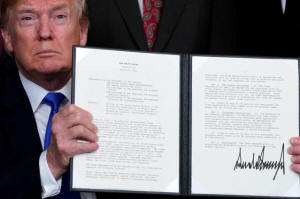|
China urges U.S. away from 'brink' as
Trump picks trade weapons
 Send a link to a friend
Send a link to a friend
 [March 23, 2018]
By Ryan Woo and Adam Jourdan [March 23, 2018]
By Ryan Woo and Adam Jourdan
BEIJING/SHANGHAI (Reuters) - China urged
the United States on Friday to "pull back from the brink" as President
Donald Trump's plans for tariffs on up to $60 billion in Chinese goods
moved the world's two largest economies closer to a trade war.
The escalating tensions sent shivers through financial markets as
investors foresaw dire consequences for the global economy if trade
barriers start going up.
Trump is planning to impose the tariffs for what he says is
misappropriation of U.S. intellectual property. A probe was launched
last year under Section 301 of the 1974 U.S. Trade Act.
"China doesn't hope to be in a trade war, but is not afraid of engaging
in one," the Chinese commerce ministry responded in a statement.
"China hopes the United States will pull back from the brink, make
prudent decisions, and avoid dragging bilateral trade relations to a
dangerous place."

In a presidential memorandum signed by Trump on Thursday, there will be
a 30-day consultation period that only starts once a list of Chinese
goods is published. That effectively creates room for potential talks to
address Trump's allegations on intellectual property theft and forced
technology transfers.
Though the White House has said the planned tariffs were a response to
China's "economic aggression", Trump said he views China as "a friend"
and the two sides are in negotiations.
A Chinese commerce ministry official said both sides were in touch.
Still, it is unclear under what terms China and the U.S. are willing to
talk, with Beijing adamant that the U.S. tariffs constitute a unilateral
move that it rejects.
China has always said it will not hold talks with the U.S. within the
framework of the Section 301 probe, Chen Fuli, director-general of the
commerce ministry's department of treaty and law, told reporters.
"Currently, we are not looking to get in a negotiation again," a senior
U.S. official told reporters in Beijing.
If China wants to avoid U.S. tariffs, it needs to start taking concrete
action, the official said, adding that Washington has not given Beijing
any to-do list to remedy trade ties.
(U.S. imports from China: http://tmsnrt.rs/2FMsz1Q)
(U.S. trade in goods with China: http://tmsnrt.rs/2GcOZIH)

READY TO RETALIATE
China showed readiness to retaliate by declaring plans to levy
additional duties on up to $3 billion of U.S. imports including fruit
and wine in response to U.S. import tariffs on steel and aluminum, which
were due to go into effect on Friday.
The inevitable fall in demand from a full-blown trade war would spell
trouble for all economies supplying the United States and China.
Feeling the chill, MSCI's broadest index of Asia-Pacific shares outside
Japan fell 2.5 percent, tracking heavy losses on Wall Street. China's
main indexes tumbled the most in six weeks, skidding up to 3.6 percent.
"Today's (U.S.) tariffs amount to no more than a slap on the wrist for
China," Mark Williams, Chief Asia Economist at Capital Economics, wrote
in a note. "China won't change its ways. Worries about escalation
therefore won't go away."
Williams estimated that the $506 billion that China exported to the
United States drove around 2.5 percent of its total gross domestic
product, and the $50-60 billion targeted by the U.S. tariffs contributed
just around 0.25 percent.
Trump, however, appears intent on fulfilling election promises to reduce
the record U.S. trade deficit with China. A commentary published by the
official Xinhua news agency said the United States had adopted a "Cold
War mentality", and "panic" over China's economic rise was driving
Washington's confrontational approach.
[to top of second column]
|

President Donald Trump holds a signed memorandum on intellectual
property tariffs on high-tech goods from China, at the White House
in Washington, U.S. March 22, 2018. REUTERS/Jonathan Ernst

U.S. multi-nationals at a business gathering in Shanghai were warned
by Stephen Roach, a Yale University economist, "to prepare for the
worst" and make contingency plans until calmer heads prevail.
Roach said he could foresee "the Chinese government moving to
restrict, in some form or another, the financial as well as the
supply chain activities of American companies operating in this
country."
Foreign Ministry spokeswoman Hua Chunying said China would not hold
back in retaliating.
"It's impolite not to give as good as one gets," Hua told reporters.
LOW HANGING FRUIT
Alarm over Trump's protectionist leanings mounted earlier this month
after he imposed hefty import tariffs on steel and aluminum under
Section 232 of the 1962 U.S. Trade Expansion Act, which allows
safeguards based on "national security".
On Friday, Trump gave Canada, Mexico, Argentina, Australia, Brazil
and South Korea and the European Union temporary exemptions. China
was not exempted even though it was a far smaller supplier than
Canada or South Korea.
Also omitted from the exemption list was U.S. ally Japan, though a
government spokesman said Tokyo would press to be included. And
Finance Minister Taro Aso expressed empathy with Washington over
protecting intellectual property.

China's retaliation against the U.S. tariffs on steel and aluminum
appeared restrained.
China has drawn a list of 128 U.S. products that could be hit with
tariffs if the two countries are unable to reach an agreement on
trade issues, the ministry said.
Without giving a timeframe, the commerce ministry said China was
considering implementing measures in two stages: first a 15 percent
tariff on 120 products including steel pipes, dried fruit and wine
worth $977 million, and later, a 25 percent tariff on $1.99 billion
of pork and recycled aluminum.
U.S. wine exports to China last year were $79 million, according to
the U.S. Wine Institute, which represents Californian wine makers.
Fruit growers in California, Florida, Michigan and Washington all
stood to lose as China's list also included close to 80 fruit and
nut products. The U.S. exported $669 million of fruit, frozen juice
and nuts to China last year, and it was the top supplier of apples,
cherries, walnuts and almonds.
"With the restrained response, China hopes Trump can realize his
errors and mend his ways," said Xu Hongcai, deputy chief economist
at the China Centre for International Economic Exchanges, a Beijing
think tank.

"If we really want to counter, the strongest response would be to
target soybean and automobiles. China is drawing its bow but not
firing. We still have some cards to play."
(Additional reporting by John Ruwitch, Elias Glenn, Dominique
Patton, Josephine Mason, Ben Blanchard, Christian Shepherd, Meng
Meng, Tom Daly, Wang Jing and Lusha Zhang; Editing By Simon
Cameron-Moore)
[© 2018 Thomson Reuters. All rights
reserved.]
Copyright 2018 Reuters. All rights reserved. This material may not be published,
broadcast, rewritten or redistributed.
Thompson Reuters is solely responsible for this content. |